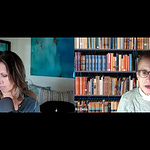Will AI become god? That’s a question pondered a lot these days in many articles, like this one: The god in the machine or Will our children worship AI as a god? At a recent panel at Harvard Divinity school, the question of whether AI was a god was also contemplated. Here’s another one: Can Silicon Valley find God?
All these questions are future-looking as though we’ve not already assigned god-like levels of worship to random things. Man has worshiped a golden calf that literally sat there, quipped Thomas Arnold, Research Associate at the Human Robot Interaction Lab at Tufts University. He also manages programs (content and events) at AI and Faith, an organization seeking to integrate religion into the building of ethical machines. In other words, it is in our human nature to seek something transcendent, something divine, something other to worship. We’ve been doing it for millennia.
The question AI has forced us to ask therefore is: What is it in our nature that compels us to seek a god or assign god-like qualities to AI? Hence, what is it about our human nature or what is human nature?
These questions have been largely brushed under the rug since the 18th century Age of Enlightenment intellectual movement, when reason and science trumped God and religion in the quest to find knowledge. As Peter Thiel said in his essay The Straussian Moment, “The death of God was followed by the disappearance of the question of human nature” and “questions about the nature of humanity would be viewed on par with the struggle among the Lilliputians about the correct way to cut open an egg” - they were “too perilous a question to debate.” (Note: One of the reasons Peter spoke at the first CRT event in 2021 and why I started the CRT events/podcasts was to explore this question)
Now that AI has created awareness of a machine imitating humans or becoming super humans, this question about human nature has reared its head and has become a vibrant debate amongst naturalists, scientists and theologians. The theologians, of course, determine that God had his hand in creation of humans.
In my interview with Thomas, he talks about his long-time interest in understanding the intersection between religion and technology well before ChatGPT. But it wasn’t until the power of ChatGPT and explanations of its abilities in anthropomorphic terms did more people get the value of his studies because to understand super intelligence requires the components of morality and wisdom. A super human intelligent machine may know how to hoard all the toys in the world for itself, but if it did and destroyed the planet, would that be intelligent? Therefore does super intelligence require some moral reasoning and wisdom? These are questions Thomas mulls almost daily.
In our conversation, we also talk about what it means to have a conscience. In Romans 2:15, it says: “They show that the requirements of the law are written on their hearts, their consciences also bearing witness, and their thoughts sometimes accusing them and at other times even defending them.” Can this law written in our hearts be coded into a machine? Moreover, how does one code the irrational decisions men make that often are required in a learning process? Paul states this in Romans 7:15 - “I do not understand what I do. For what I do I do not do, but what I hate I do.”
To this conundrum, Thomas says we’re reminded that “even optimizing how to make decisions, we lose complexity on how decisions are based on stories, a loved one, a hero, a role model…. This is a judgement issue that is nuanced,” he said.
To learn more about Thomas and his work, go to his profiles on: Google Scholar, LinkedIn
Interview coverage:
3:00 - The path from philosophy to religious studies to thinking about autonomous systems and how moral decision-making could be coded.
6:00 - The AI ethics boom in 2015-2016 and how to integrate religion and how ChatGPT made the discussion of the intersection of religion and tech more salient.
8:20 - Convergence: Ethics and mathematics have to do with one another. You can’t ignore the intersections of different disciplines, such as math, ethics and religion, culture and technology.
9:00 - The internet got the conversation started in the mid-90’s around what’s the relationship between culture and tech.
10:41 - AI and Faith - the organization and its mission.
13:07 - The challenge of aligning human values is that they’re not monolithic. What are the implicit ideals that certain traditions have around compassion and does perfect compassion require one who suffers directly?
18:00 - Operationalizing compassion.
20:41 - What’s the role of the AI within a larger environment?
21:51 - Ideas around systems using moral criteria.
23:30 - Machines shouldn’t ever have full autonomy but nothing on the horizon suggests that it promises to ever reach that level.
24:40 - We have limited coding around compassion. With regards to AI incorporating compassion. It’s way into the future or just not going to happen on both technical grounds and concrete interactive challenges such as how does a robot’s actions affect the entire environment?
32:00 - A system doesn’t have to be advanced at all for people to attribute it a god-like sense. The golden calf didn’t have to do much to reach god levels. Can chatbots be real guides, this process is already happening on a very rudimentary scale. We are prone to attribute agency to machines. You don’t need to design for super human.
36:32 - Can AI have a conscience? Conscience is instrumental in determining right from wrong. Can humans even explain the origin of their conscience?
41:08 - AI’s impact on grieving.
48:00 - Advancements in robotics.
52:00 - Discerning between imitating a moral reason vs making a moral reason. What qualifies? And thoughts on a moral Turing test.
(source: Moviecrashcourse. Golden calf in the movie 10 Commandments)











